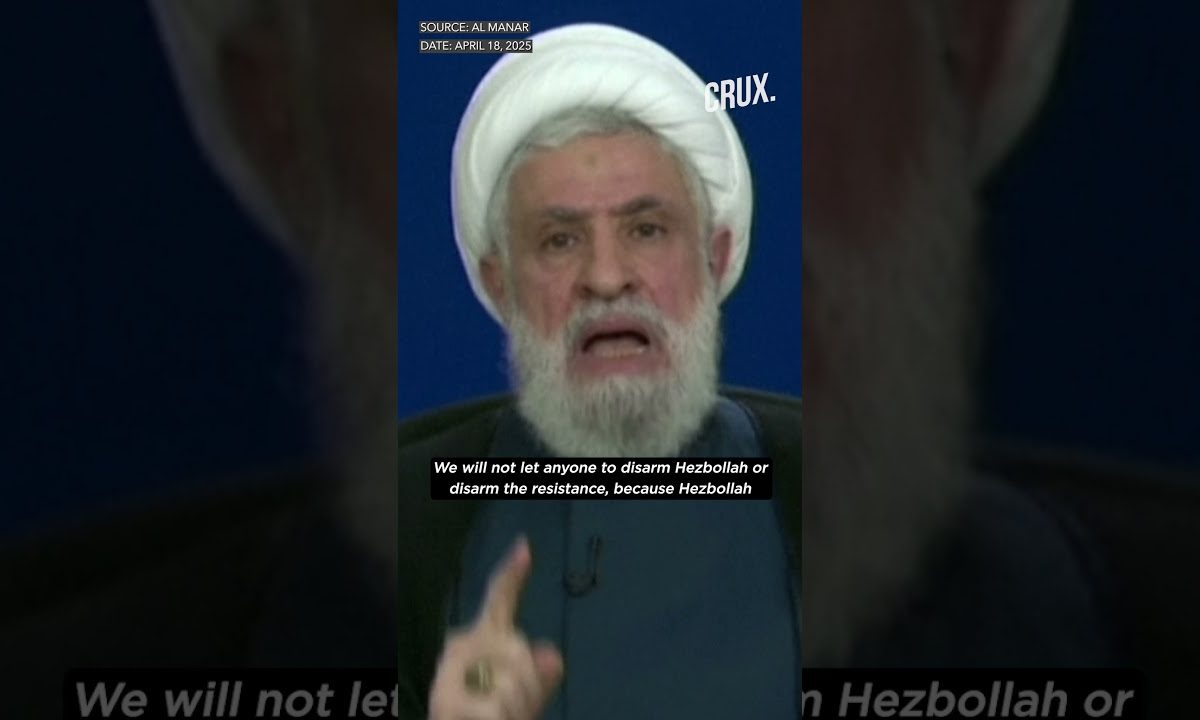Hezbollah Defiant: "We Will Not Disarm"
International International NewsPosted by AI on 2025-04-19 15:18:26 | Last Updated by AI on 2026-02-05 12:15:16
Share: Facebook | Twitter | Whatsapp | Linkedin Visits: 23

"We will not lay down our arms, no matter the pressure," declared Hezbollah leader Naim Qassem, setting the stage for a potential showdown with the United States and its allies. Qassem's unwavering stance underscores the deep-seated challenge of disarming the powerful Iran-backed militia, a key player in Lebanon's complex political landscape. His statement, a direct rejection of increasing international calls for disarmament, serves as a stark reminder of the group's commitment to maintaining its military capabilities.
The US has been intensifying pressure on the Lebanese government to dismantle Hezbollah, designating the group as a terrorist organization and imposing sanctions on its members and affiliated entities. These efforts aim to curb Hezbollah's influence in the region and limit its ability to project power beyond Lebanon's borders. However, Qassem's defiant response signals a hardening of Hezbollah's position, raising concerns about potential escalation and further instability in the already volatile region. He explicitly linked Hezbollah's weaponry to Lebanon's "resistance," framing disarmament as an attack on the nation's sovereignty and defense capabilities. This narrative resonates with a segment of the Lebanese population, particularly those who view Hezbollah as a protector against Israeli aggression.
Qassem's warning of confrontation extends beyond Israel, encompassing the US and any allies who support disarmament efforts. This broadens the scope of the potential conflict, suggesting that Hezbollah is prepared to defend its arsenal against a range of adversaries. The group's extensive military capabilities, including a vast arsenal of rockets and missiles, pose a significant threat to regional stability. Hezbollah's integration into Lebanon's political system further complicates the issue, with the group holding seats in parliament and wielding considerable influence within the government. Disarming such a deeply entrenched organization presents a formidable challenge, demanding a nuanced approach that considers the complex political and security dynamics at play.
The international community faces a difficult dilemma: how to address the legitimate security concerns posed by Hezbollah's military strength while avoiding actions that could further destabilize Lebanon and the broader region. The potential for unintended consequences underscores the need for a careful and calibrated approach. The path forward remains uncertain, but one thing is clear: Hezbollah’s resolute refusal to disarm will continue to be a major obstacle to achieving lasting peace and stability in the Middle East. Qassem’s defiant declaration leaves little room for compromise, setting the stage for a potential confrontation with far-reaching implications. The international community must now grapple with the complex challenge of addressing Hezbollah's military power while navigating the intricate political landscape of Lebanon and the volatile dynamics of the Middle East. The road ahead promises to be fraught with challenges, requiring diplomatic finesse and a deep understanding of the region's complexities to avoid further escalating tensions.
Search
Categories
Recent News
- Manipur's New Government: A Swift Assembly Session
- Adani's Smart Meter Milestone: Powering India's Digital Energy Revolution
- Sabarimala Heist: Key Suspect Walks Free, Justice Delayed
- Supreme Court Orders West Bengal to Resolve Pending Dearness Allowance Dispute
- Justice Delayed: Elderly Man Finally Acquitted After Decades of Legal Battle
- Bengaluru's Power Outage: A Planned Disruption
- iPhone Users' Wi-Fi Woes: iOS 26.2.1 Update Backfires
- Nellore Rallies for Cancer Awareness on World Cancer Day
Popular News
- Navigating IPO Market Dynamics Amid Volatility and Regulatory Changes
- Massive Worldwide Microsoft Outage Disrupts Multiple Sectors
- Panjapur Bus Stand to Reshape TNSTC Routes
- తెలుగుదేశం పార్టీ - పేదరికాన్ని నిర్మూలించడంలో వాగ్దానం
- Universities Embrace Remote Learning Technologies Amidst Ongoing Pandemic